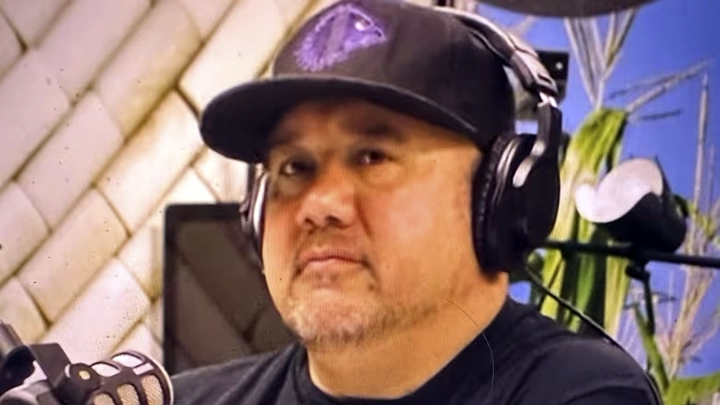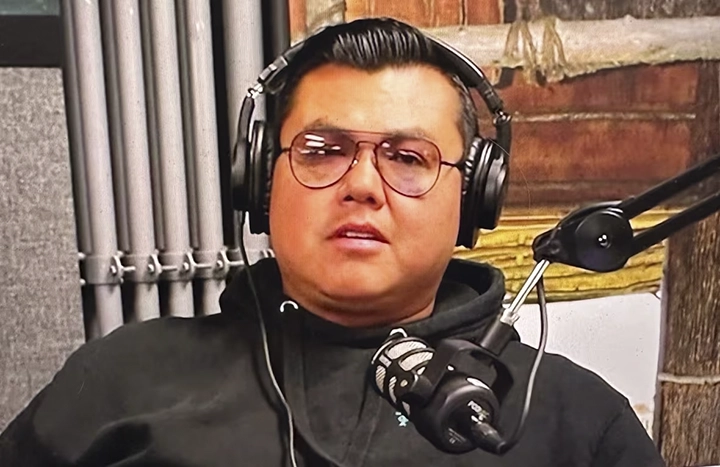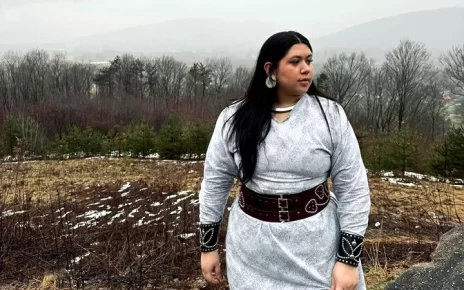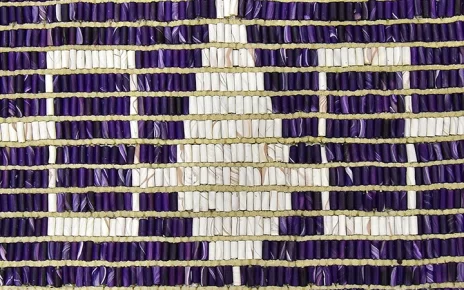‘It’s still kind of upholding that oral tradition of sharing, passing knowledge on and talking’
January 31, 2024 | By Candace Maracle · CBC News | cbc.ca
It used to be that a Longhouse was the only place where you could hear traditional Haudenosaunee teachings but now they’re becoming more accessible to engage a younger generation.
Ansley Jemison, who is wolf clan from the Seneca nation, is the host of Original Peoples podcast, which will celebrate its second anniversary this month. He is embracing the once controversial concept of putting sacred teachings in the digital space.
“We wanted to be able to create a space [where] there was access to this information,” Jemison said.
“A lot of the stuff that we’re sharing, you know, we’re being respectful and mindful of the sacred aspect of the ceremonial life.”
Jemison works at Ganondagan, a state historic site of a 17th century Seneca village in Victor, N.Y., near Rochester.


Left: Ansley Jemison is the host of Original Peoples podcast. This month marks the one-year anniversary of his podcast. Right: A recurring guest on the Original Peoples podcast, Jamie Jacobs said it was important to him to help dispel myths about Handsome Lake. (Photos submitted by Ansley Jemison)
He heard the traditional teachings of the Haudenosaunee growing up because his father was a Faithkeeper in the Longhouse — something he acknowledges he was fortunate to have access to.
Jemison said policies like boarding schools in the U.S., which discouraged traditional ways and were run with mandates similar to residential schools in Canada, prevented many from accessing the knowledge he’s learned.
He said his podcast is part entertainment, but also part storytelling.
“It’s still kind of upholding that oral tradition of sharing, passing knowledge on and talking,” he said. Jemison said he’s received positive feedback about the podcast.
Talking about Handsome Lake
His most popular episodes offer what he calls a deep dive into the Code of Handsome Lake. Handsome Lake is often referred to as a Seneca religious leader, but that’s controversial in the Haudenosaunee community because many believe Handsome Lake’s teachings were rooted in Quakerism.
In the late 1700s, Handsome Lake saw the displacement of his people, theft of land and wars with colonists, disease and alcohol abuse. This prompted his message for the people, called the Gaiwiio or “good word,” which combined Christian ideology with traditional Haudenosaunee teachings.
Handsome Lake’s message is still preached in Haudenosaunee communities today at Midwinter ceremonies in the Longhouse.
Jemison said he wanted to learn more about who Handsome Lake was as a person rather than the mythical being he thought of him as, growing up.
Jamie Jacobs, who is Seneca, is a curator at the Rochester Museum and Science Centre and a traditional quill worker who has done extensive research on Handsome Lake including his family tree and he shares some of his research on the podcast.
Jacobs said Handsome Lake’s message was intended to help his people survive after colonization. He said one of the biggest takeaways from Handsome Lake’s message was that change was coming, “but we still have to preserve what our ancestors laid down for us and what the Creator meant for us.”
Hoping to spark interest
Jacobs said he was aware he was leaving himself vulnerable to criticism by speaking about Gaiwiio and traditional aspects of his culture on a mainstream platform.
“I’m fully willing to do that if it sparks interest in people to be motivated to rematriate certain aspects of our culture, to have a better understanding of, you know, where we stand as Haudenosaunee people,” Jacobs said.
Jacobs said he understands his people’s hesitation with sharing traditional teachings, because he used to feel the same way. But as communities lose elders, he says the benefits of sharing the knowledge outweighs the criticism.
Jacobs said he knew he could trust Jemison with the teachings because Jemison understands how to deal with culturally sensitive information.
“We’re not doing this to exploit, you know, cultural information the way that our white brothers do or like they have done in the past,” said Jacobs.
Trav Hill, who is Tuscarora, lives in Fort Erie, Ont., and said the podcast resonated with him so much that he listened to the Gaiwiio episodes twice.
He said he was inspired by the Original Peoples podcast and this year for the first time attended Midwinter ceremonies on his reserve, to get his traditional Onkwehonwe (Indigenous) name.
Hill said old Haudenosaunee social dance songs were recorded back in the ’70s on cassette tape —something considered controversial at the time. He said he wouldn’t have learned how to sing if it weren’t for those tapes.
“[As] Onkwehonwe we’ve always had to adapt and that’s a part of our resilience,” he said.

ORIGINAL PEOPLES PODCAST:
Podcasting through an Indigenous lens, sharing stories and culture through Indigenous People, reminding our neighbors that we as a people are still here today. We have been here since the beginning and throughout, despite the challenges and Cultural Genocide inflicted upon the Original People. We are not relegated to history books, we are contemporary, we are real and we are knowledgeable. I want to introduce you to cool Native People doing cool things. Tune in and learn how we navigate the world we share, as Indigenous knowledge holders, artists, activists, athletes, entrepreneurs & educators.
Listen HERE: Apple Podcasts | Spotify





